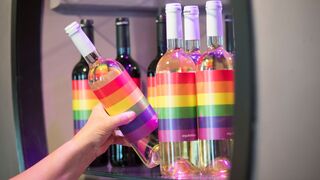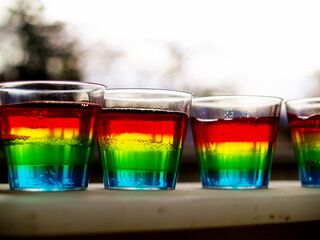Alcoholism
Drinking to Party or Cope?
Let’s talk about alcohol use in the LGBTQ+ community.
Posted October 31, 2022 Reviewed by Vanessa Lancaster
Key points
- LGBTQ+ individuals are at increased risk of developing alcohol use problems compared to their heterosexual counterparts.
- Minority stress theory may help to explain these differences since discrimination can compromise mental health.
- Drinking may be a form of self-medication to reduce negative emotions, including those from minority stress exposure.
- Psychological treatments that address minority stress related to the LGBTQ+ experience can promote coping and reduce drinking problems.
Co-authored by Kyla-Rose Walden and Darby Saxbe
Picture the LGBTQ+ community; you might imagine a vibrant nightlife scene centered around drinking and dancing. From the Stonewall Inn to The Castro, bars and nightclubs have long served as safe havens and places to find joy and connection for the queer community.
But alcohol use in the community may not always be such a celebration. In fact, LGBTQ+ individuals are at heightened risk of alcohol problems. But what does the data tell us?

Our current research indicates that overall, LGBTQ+ individuals have an increased risk for the development of alcohol use problems and use alcohol more in general compared to their heterosexual counterparts.
Moreover, the community reports more negative alcohol use-related consequences and has higher rates of binge drinking. Discrimination on the basis of sexual orientation has been identified as a mechanism that might relate to this increased risk.
Relevant to our current sociopolitical context (e.g., Florida’s “don’t say gay” and anti-transgender policies), anti-LGBTQ+ legislation has also been associated with problematic alcohol use. For example, a study following LGBTQ+ adults before marriage equality legislation was passed found a 42 percent increase in alcohol use disorders when same-sex marriage bans were implemented in their state.
Of course, this issue is not black and white. Several factors can influence these outcomes, such as self-efficacy in coping, social support, race/ethnicity, gender, and age group, which may interact to increase or protect against risk for alcohol use disparities. But overall, these studies make one thing very clear: systemic and interpersonal discrimination are related to alcohol use outcomes. But why is this the case?
"Minority-stress-theory," developed by the researcher Ilan Meyer, helps explain why we see a greater risk of mental health and substance abuse among individuals who are LGBTQ+. This theory suggests that experiences of discrimination and prejudice based on sexual orientation–ranging from systemic discrimination to interpersonal hate crimes to subtle microaggressions–degrade mental health. A great deal of research has corroborated Meyer's theory, indicating that psychological disorders such as depression, anxiety, and other diagnoses occur at higher rates in LGBTQ+ individuals, especially those who report greater minority stress.
But how does this relate to alcohol use? To understand this, let’s talk about how alcohol use problems develop in general. Alcohol use problems can emerge from complex interactions of genetic and environmental factors, but three primary developmental models are widely accepted in the field. The first, the behavioral undercontrol pathway, suggests that people who tend to be more impulsive may show more problem drinking. The second, the positive affect regulation pathway, means that people might drink too much because it feels good–it increases their positive emotions and rewarding feelings. The third and final pathway–negative affect regulation–is just the opposite, suggesting that drinking can become more of a self-medication to reduce negative emotions, stress, anxiety, and discomfort.

This last model can help us understand problematic alcohol use in the LGBTQ+ community. Discrimination and prejudice can lead to stress, anxiety, and a desire to escape and avoid. So how about a drink to take the edge off? Or maybe two or three.
Minority stress theory helps us understand why LGBTQ+ individuals may use alcohol to regulate the consequences of these stressors.
Naturally, changing the conditions that lead to anti-LGBTQ+ discrimination and exacerbate minority stress will take time. However, efforts to combat current anti-LGBTQ+ legislation could have tremendous benefits for the community's mental health and psychological well-being. Moreover, providing safe community spaces not centered around alcohol can help mitigate risk. But if you personally relate to this post or are struggling–what can you do?
Research shows that psychological treatments that integrate and address specific stressors related to the LGBTQ+ cultural experience and promote coping self-efficacy may be effective. These proof-of-concept studies indicate that these interventions can help provide an accessible way to improve mental health, substance/alcohol use, and other risk behaviors in the community.
Simply put, therapy that provides sensitivity and competence surrounding the LGBTQ+ cultural experience can help reduce minority stress and improve psychological well-being. Psychology Today provides lists of LGBTQ+-affirming therapists that may suit those needs.
As awareness of this issue increases, structural conditions improve, and psychological science continues to pave a path forward toward further addressing the needs of minoritized groups, we can reduce the problem of drinking to cope and enhance psychological well-being in the LGBTQ+ community.
To find a therapist near you, visit the Psychology Today Therapy Directory.
References
Cochran, S. D., Sullivan, J. G., & Mays, V. M. (2003). Prevalence of mental disorders, psychological distress, and mental health services use among lesbian, gay, and bisexual adults in the United States. Journal of consulting and clinical psychology, 71(1), 53.
Fish, J. N., & Baams, L. (2018). Trends in Alcohol-Related Disparities Between Heterosexual and Sexual Minority Youth from 2007 to 2015: Findings from the Youth Risk Behavior Survey. LGBT health, 5(6), 359–367. https://doi.org/10.1089/lgbt.2017.0212
Hamilton, C. J., & Mahalik, J. R. (2009). Minority stress, masculinity, and social norms predicting gay men's health risk behaviors. Journal of Counseling Psychology, 56(1), 132-141. doi:http://dx.doi.org/10.1037/a0014440
Hatzenbuehler, M. L., McLaughlin, K. A., Keyes, K. M., & Hasin, D. S. (2010). The impact of institutional discrimination on psychiatric disorders in lesbian, gay, and bisexual populations: A prospective study. American journal of public health, 100(3), 452-459
Hughes, T. L., Wilsnack, S. C., & Kantor, L. W. (2016). The influence of gender and sexual orientation on alcohol use and alcohol-related problems: Toward a global perspective. Alcohol Research: Current Reviews, 38(1), 121–132
Meyer, I. H. (2003). Prejudice, social stress, and mental health in lesbian, gay, and bisexual populations: conceptual issues and research evidence. Psychological bulletin, 129(5), 674.
Meyer, I. H. (2010). Identity, stress, and resilience in lesbians, gay men, and bisexuals of color. The counseling psychologist, 38(3), 442-454
Pachankis, J. E., & Bränström, R. (2018). Hidden from happiness: Structural stigma, sexual orientation concealment, and life satisfaction across 28 countries. Journal of Consulting and Clinical Psychology, 86(5), 403-415
Pachankis, J. E., McConocha, E. M., Clark, K. A., Wang, K., Behari, K., Fetzner, B. K., Brisbin, C. D., Scheer, J. R., & Lehavot, K. (2020). A transdiagnostic minority stress intervention for gender diverse sexual minority women’s depression, anxiety, and unhealthy alcohol use: A randomized controlled trial. Journal of Consulting and Clinical Psychology, 88(7), 613–630. https://doi.org/10.1037/ccp0000508
Pachankis, J. E., Harkness, A., Maciejewski, K. R., Behari, K., Clark, K. A., McConocha, E., Winston, R., Adeyinka, O., Reynolds, J., Bränström, R., Esserman, D. A., Hatzenbuehler, M. L., & Safren, S. A. (2022). LGBQ-affirmative cognitive-behavioral therapy for young gay and bisexual men's mental and sexual health: A three-arm randomized controlled trial. Journal of consulting and clinical psychology, 90(6), 459–477. https://doi.org/10.1037/ccp0000724
Reed, Prado, G., Matsumoto, A., & Amaro, H. (2009). Alcohol and drug use and related consequences among gay, lesbian and bisexual college students: Role of experiencing violence, feeling safe on campus, and perceived stress. Addictive Behaviors, 35(2), 168–171. https://doi.org/10.1016/j.addbeh.2009.09.005
Sher, K., Grekin, E., & Williams, N. (2005). The development of alcohol use disorders. Annual Review of Clinical Psychology, 1(1), 493–523. https://doi.org/10.1146/




